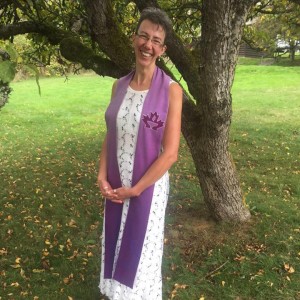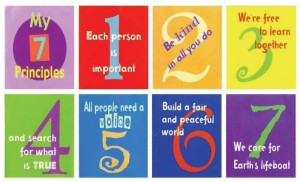The Ceremonies Project was an idea by Liz James inspired by material created by Amanda Tarling. The project has been generously sponsored by The Unitarian Congregation of Saskatoon, Capital Unitarian Universalist Congregation, The Canadian Unitarian Council, and by the contributions from Northern Lights and The Unitarian Universalist Association.

Amanda Tarling is passionate about creating rituals. She created her first ceremony, a Blessingway, in 1998 to celebrate the imminent birth of her daughter. Since then she has created and led hundreds of ceremonies. She is currently a Lay Chaplain with Capital Unitarian Universalist Congregation in Victoria BC. When she isn`t celebrating rites of passage you can find her hiking in the Sooke Hills or doing Hot Yoga.

Liz James
Liz James is a seminarian, blogger, and mom of four. She believes passionately that ritual is a human right, and shouldn’t be linked to a specific religion or set of beliefs. She became involved in the Ceremonies project after holding a pigeon funeral for her kids… another parent asked her how she knew how to do pigeon funerals. She realized the importance of ritual resources being available online, and took on fundraising for the project.
Our thanks to Dick Jackson for the web design and ongoing consultation and advice.

We believe ceremony and ritual are a part of being human. We don’t care what your religion is, or if you don’t have one at all. That said, we feel we should mention that we do have a religion. It’s informed what we’ve created here, although we’ve designed our materials to be usable by anyone.
We’re Unitarian Universalist, which is a tradition that spans centuries and draws from a variety of sources for it’s practice. Unitarian Universalists are a diverse group, including atheists, theists, and agnostics of all types. Turns out, you don’t have to believe the same things to join together in spiritual community. In fact, it’s pretty amazing to share a spiritual community with neighbours who believe very different things from what you do.
If you resonate with the ceremonies and rituals on this site, you might want to check us out. Below are links to our principles (the closest thing we have to a “who we are” statement), and a bit more about us!
The following is from the Canadian Unitarian Council’s website. Unitarian Universalism (UUism) is a liberal religious faith grounded in the principle of covenant. UU communities come together in covenant of our shared principles. Our beliefs are diverse, and we walk our paths to spiritual discovery and truth together.
Unitarians are united by values rather than belief in one set of creed or dogma. Our values include acceptance of one another, compassion, and a commitment to justice and equity. We believe in exploring the mysteries of life, we believe in ethical living, we believe in living out our spirituality in this world by working for peace, justice, equality, democracy, and respect—for one another, as well as for the interdependent web of life, of which we are all a part.
We believe that it is not who or what you believe in that is important, but rather, how you live your life.

The 7 Principles of Unitarian Universalism
Unitarians draw inspiration from many religious, theological, philosophical and ethical sources, and as individuals and member congregations, we are bound together by our affirmation of our 7 principles:
We, the member congregations of the Canadian Unitarian Council, covenant to affirm and promote:
- The inherent worth and dignity of every person;
- Justice, equity, and compassion in human relations;
- Acceptance of one another and encouragement to spiritual growth in our congregations;
- A free and responsible search for truth and
meaning; - The right of conscience and the use of the democratic process within our congregations and in society at large;
- The goal of world community with peace, liberty, and justice for all;
- Respect for the interdependent web of all existence of which we are a part.
Sources
The living tradition which we share draws from many sources:
- Direct experience of that transcending mystery and wonder, affirmed in all cultures, which moves us to a renewal of the spirit and an openness to the forces which create and uphold life;
- Words and deeds of prophetic women and men which challenge us to confront powers and structures of evil with justice, compassion, and the transforming power of love;
- Wisdom from the world’s religions which inspires us in our ethical and spiritual life;
- Jewish and Christian teachings which call us to respond to God’s love by loving our neighbours as ourselves;
- Humanist teachings which counsel us to heed the guidance of reason and the results of science, and warn us against idolatries of the mind and spirit;
- Spiritual teachings of Earth-centred traditions which celebrate the sacred circle of life and instruct us to live in harmony with the rhythms of nature.
Grateful for the religious pluralism which enriches and ennobles our faith, we are inspired to deepen our understanding and expand our vision. As free congregations we enter into this covenant, promising to one another our mutual trust and support.

Les principes et les sources de notre tradition religieuse
Les principes
Nous, assemblées membres du Conseil unitarien du Canada, sommes vouées à la reconnaissance et à la promotion des principes suivants:
- la valeur et la dignité intrinsèques de toute personne;
- la justice, l’équité et la compassion comme fondements des relations humaines;
- l’acceptation mutuelle et l’encouragement à la croissance spirituelle au sein de nos assemblées;
- la liberté et la responsabilité de chaque personne dans sa recherche de la vérité, du sens de la vie et de la signification des choses;
- la liberté de conscience et le recours au processus démocratique aussi bien dans l’ensemble de la société qu’au sein de nos assemblées;
- l’aspiration à une humanité où régneront la paix, la liberté et la justice pour tous;
- le respect du caractère interdépendant de toutes les formes d’existence qui constituent une trame dont nous faisons partie.
Les sources
Nous avons puisé à des sources diverses la vivante tradition que nous partageons:
- l’expérience directe du merveilleux et transcendant mystère, universellement reconnu, qui suscite un renouveau de l’âme et une attitude réceptive envers les forces qui sont à l’origine de la vie et veillent à son épanouissement;
- les paroles et les actions de visionnaires, hommes et femmes, qui nous incitent à miser sur la justice, la compassion et le pouvoir de transformation de l’amour pour affronter le mal sous toutes ses formes;
- la part de sagesse de toutes les religions qui est, pour nous, une source d’inspiration morale et spirituelle;
- les enseignements du christianisme et du judaïsme qui nous convient à aimer notre prochain comme nous-mêmes en reconnaissance de l’amour que Dieu nous manifeste;
- le message humaniste qui nous invite à utiliser notre raisonnement et à prendre en considération les résultats de la science, et qui met en garde notre âme et notre esprit contre toute forme d’endoctrinement et de fanatisme religieux;
- les enseignements spirituels des traditions qui célèbrent le cycle sacré de la vie, nous invitant à vivre en harmonie avec les rythmes de la nature.
Remplis de gratitude envers le pluralisme religieux qui enrichit et ennoblit notre foi, nous sommes animés par le désir d’approfondir notre compréhension et de développer notre perspicacité. En tant qu’assemblées autonomes, nous souscrivons à cette déclaration de principes, nous engageant à nous témoigner mutuellement soutien et confiance.